[Document 1145]
Department of State Policy Statement1
[Washington,] May 5, 1949.secret
Turkey
a. objectives
Our fundamental objective in the eastern Mediterranean and Middle East is to promote peace and stability. This requires that we endeavor to prevent rivalries and conflicts of interest in that area from developing into open hostilities which might eventually lead to a third world war. In the case of Turkey, we are committed to a peacetime policy of military and economic assistance with the object of preserving that nation’s independence and maintaining it in its present role of bulwark against Soviet expansion in the Near and Middle East. As a corollary, any effect which US aid may have in building up Turkey’s military strength will to that extent tend to make available to the US and to our allies the Use of this vitally strategic area as a base of operations in the event of war, and conversely to deny the Soviet Union and its satellites access to its land and resources.
A second US objective toward Turkey is to assist, by appropriate means, that government’s determined and successful efforts to achieve a fuller democracy and a more productive economy, and thus to counteract the infiltration of Communism and Soviet influence not only in Turkey but in adjacent countries to the south and east.
b. policies
The cornerstone of Turkish foreign policy in recent years has been traditional and unflinching resistance to Russia. Since the war, the USSR has caused deep apprehension in Turkey by intermittent pressure for a dominant role in the control of the Turkish Straits, by its claims to Kars and Ardahan, and by carefully contrived border incidents and troop movements on Turkey’s Bulgarian and Caucasian frontiers, to the accompaniment of press and propaganda diatribes from Moscow. Although there have been no new demands in recent months, none of the demands made by Moscow has been retracted. In the circumstances, the Turks feel that they are obliged to keep more men under arms and out of productive labor than their present economy can well support.
1. Political
The present US policy of active assistance to Turkey had its inception when the British, on February 24, 1947, informed the Secretary of State that as of March 31, 1947, the UK would be obliged to discontinue the military, economic and advisory assistance which it had been giving to Greece and Turkey. The latter government had on various occasions applied to the US for financial aid, but until the enactment of Public Law 75 (the Greek-Turkish Aid Act) we lacked the facilities for acceding to these requests. During the first year after the passage of this legislation (May 22, 1947), we instituted a military, naval and air force modernization and training program, as well as a limited public roads program, making available to Turkey by outright grant equipment and services of a value of $100,000,000.2 The Aid Program is now well into its second year, under the legislative authority of Title III, Public Law 472, with an additional allotment, under present estimates, of between $50,000,000 and $75,000,000. Of the total for the two years, $106,864,476 had been encumbered as of January 31, 1949. It is hoped that the US military assistance will result in the formation of a more compact and effective national defense structure of decreased manpower but with greater mobility and firepower, and thus make an effective contribution to Turkey’s determination to resist Soviet pressure as well as releasing manpower badly needed for economic development.
There are no serious outstanding political issues between the US and Turkey. Despite certain misunderstandings, our relations are currently sound and based upon mutual awareness of our common cause. Prior to the inauguration of the US-Turkish Aid Program, We gave Turkey our active diplomatic support in rejecting Soviet demands for joint control of the Straits, and our moral support in resisting the Kars-Ardahan and Georgian claims put forward quasi-officially by Moscow.
We have encouraged Turkey’s policies of active participation in the affairs of the United Nations, the maintenance of its 1939 alliances with the UK and France, and its desire to seek in so far as possible the friendship of all nations, including the USSR. Turkey feels itself to be in an exposed and precarious situation, however, and is constantly seeking reassurances regarding its security. The Turkish Ambassador early sought US support for Turkey’s adherence to the North Atlantic pact, but, as the situation developed, Turkey was deemed ineligible for membership because of the complications that would ensue if the alliance were extended beyond the Western European-North Atlantic area. Both the US and the UK recognized, however, that the conclusion of the pact might have undesirable repercussions on Turkey as well as other nations such as Greece and Iran necessarily excluded from its scope. Not only these nations but the USSR might construe such an omission as an indication that aggression against those states would not cause any serious reaction on the part of the major Western powers. The US and UK, therefore, considered an attempt to counteract this dangerous possibility by the issuance of special declarations which, in the case of Turkey, would serve to supplement and reemphasize President Truman’s statement of October 29, 1948.3 When we intimated this possibility to the Turks, they took the position that only the US, the UK and possibly France should be parties to a declaration since nothing was to be gained by a statement regarding Turkey’s security emanating from the smaller European nations. Since the announcement of the North Atlantic Treaty, the Secretary of State has twice referred publicly to our continuing interest in Turkey,4 and the President again adverted to it in his speech at the Treaty signing ceremonies.5 No further formal declarations are planned at the present time.
Meanwhile, Foreign Minister Sadak has been actively exploring the possibilities of establishing a Mediterranean pact, similar in principle to the North Atlantic alliance. During February 1949, he journeyed to London, Paris and Brussels, but his conversations with Bevin, Schuman and Spaak6 were largely inconclusive. We informed the Turkish Ambassador that we were not prepared, at this time, to take a position either for or against such a regional grouping. Sadak has publicly reiterated Turkey’s willingness to join a Mediterranean pact as a supplementary means of safeguarding peace in the Middle East. Despite Turkey’s exclusion, he hailed the North Atlantic Treaty as a measure “that will bring confidence to European nations and thus help to prevent war.”
We have welcomed Turkey’s participation in the European Recovery Program and are making available ECA funds in limited amounts on a credit basis. Entering the war late, the Turks escaped destruction of their productive facilities, and hence no problem of reconstruction is involved. As a contributor, however, Turkey is in a position to play a significant part in European recovery by increasing production and export of certain commodities.
American educational and philanthropic institutions, such as Robert College, missionary hospitals and schools in the provinces, the American College for Women and the Admiral Bristol Hospital at Istanbul, have for many years made significant contributions to Turkish-American understanding. Through them, and thanks to the general awareness of our consistently non-imperialistic foreign policy, a growing number of young Turks, some of whom now occupy influential positions in the government, have become enthusiastic disciples of the American liberal tradition and are determined that the political institutions of their Republic shall evolve along democratic western lines. It is partly for this reason that Turkey is the only country in this area in which Communism has made no headway. As soon as the Smith-Mundt and Fulbright Acts7 are fully implemented, we will be in a position to pursue these and similar activities on an inter-governmental basis. In particular, the established American educational institutions should receive our full support, including financial aid if needed.
2. Economic
Our economic policy in Turkey is to promote economic progress without domination, a general increase in production, and the expansion of multilateral world trade consistent with the principles of the Charter for an International Trade Organization. Primary US sponsorship and financing of cooperative international economic measures, and the increasingly close political and economic ties between the two countries in the face of a common threat should favor US efforts to obtain Turkish cooperation. One obstacle to obtaining such cooperation, aside from those created by general world economic and political conditions, lies in the intensely nationalistic spirit of the Turks, now slowly receding. Furthermore, many Turks fear and distrust the consequences of active foreign participation in the economic life of their country, a reaction undoubtedly traceable to the humiliating period of the Ottoman Capitulations. Their extreme sensitivity to any suggestion of an encroachment on their sovereignty must also be borne in mind.
We should encourage Turkey to keep to the fore the objectives sponsored by the US in the ITO Charter and in the General Agreement on Tariffs and Trade (GATT)8 and to adopt measures consistent with these objectives as Turkish and world conditions permit. We should urge it to ratify the Charter, which it has signed, and we believe it will do so after ratification by the US, in view of its demonstrated desire to participate in international cooperative measures supported by the leading western powers, particularly the US. We should also encourage the Turks to accede to the GATT.
While the granting of licenses for imports from the US has been drastically limited due to the dollar shortage, imports from other countries in many cases have been maintained or increased as a result of bilateral agreements and compensation or barter deals. We recognize that present world conditions make discrimination of this kind virtually inevitable and are not protesting it unless in specific cases the discrimination appears avoidable. We are hopeful that it will disappear as conditions permit the Turkish Government to adopt more liberal trade policies which we believe that it desires to do.
We should seek to avoid the recurrence of situations such as developed last year in connection with Turkey’s efforts to regain its major pre-war export market for tobacco in Germany. JEIA’s9 intention to meet German requirements through purchases of US surplus tobacco, to the virtual exclusion of Turkish tobacco, raised serious doubts in the minds of the Turks as to the sincerity of our avowed aims in promoting ERP, as well as to our desire to strengthen the Turkish economy. Recent arrangements through the ECA provide for the purchase by the German Trizone of $11.5 million of Turkish tobacco during the period January 1, 1949 through June 20, 1949, and other ERP countries have programmed large quantities of Turkish tobacco for import so that we believe Turkey’s fears have now been allayed. Situations such as the above tend to strengthen the hand of the element in Turkey which shrinks from increased involvement of Turkey in the international cooperative measures of the western powers.
We would like to negotiate a treaty of friendship, commerce and navigation with Turkey as a modern comprehensive successor to our present treaties of Commerce and Navigation (1929) and Establishment and Sojourn (1931). However, until there is a likelihood that Turkey will accept the provisions relating to national treatment which we have incorporated in other recent treaties there appears to be little to be gained by a new treaty.
In contrast to other countries in the Middle East, Turkey has been able to acquire and maintain substantial gold resources and to manage its exchange and fiscal affairs in a conservative manner. Since any economic and financial deterioration would weaken Turkey’s strategic position in the Middle East, it is our policy to help maintain its financial stability, and to provide maximum technical assistance to the Turkish Government on financial matters. In determining the extent to which Turkey should utilize its own resources before requesting assistance from the International Bank and the US Government, including ECA, we have accepted Turkey’s contention that substantial reserves of gold must be available in case of a military emergency.
The Central Bank of Turkey is understood to hold about $3.4 million worth of gold bars, identifiable as looted from Belgium and apparently acquired from Germany (perhaps unknowingly through substitution in a shipment sent from Switzerland via Germany). Our policy with respect to Turkey in this matter is the same as our policy vis-à-vis other countries similarly situated. We, in concert with the UK and France, had proposed that the Government of Turkey deliver to the Gold Pool the equivalent of the looted gold held by the Central Bank. The action proposed by the Turkish Government in answer to that note was not regarded as adequate and conclusive. Therefore, in association with the UK and France in October 1948, we proposed to the Turks a meeting of experts of the four countries to consider the restitution of looted gold and the liquidation of German assets in Turkey. A formal reply to this note has not yet been received. We will continue to press for such a meeting with the view to reaching an over-all settlement with the Turkish Government on these long outstanding interrelated problems. In the meantime, Turkey remains subject to the Treasury Department’s restrictions on the purchase of gold under the Gold Declaration of 1944.10
We believe that Turkey possesses the potentialities for economic development which, if carried out along sound lines, will raise the low standard of living of the Turkish people and improve the country’s international economic position, thus contributing to the maintenance of Turkey’s stability and making the country better able to support the military burdens which the US at present is helping to carry. We also believe that Turkey can contribute to European recovery through increased production and export of foodstuffs and minerals. Increased production of chrome is of especial interest to the US. It is our policy to lend our support, through ECA, the International Bank, and the Export-Import Bank,11 to the financing of development projects which we find to be realistically related to the potentialities and requirements of the Turkish economy. We attach particular importance to Turkey’s participation in the European Recovery Program, and we should continue to urge that Turkey’s ECA programs be given sympathetic consideration.
We should encourage the Turkish Government to take measures to attract private investment, both domestic and foreign, recognizing that continued movement away from “étatism” will be slow and will be conditioned by the ability of private capital to demonstrate that it can contribute to Turkey’s development.
We should discourage the Turkish Government from further ostentatious adventures in production for which the country is not ready, and should emphasize the importance of better agricultural methods, improved transportation, and the training of Turkish technicians at home and abroad, through apprenticeship as well as by formal schooling. As funds become available for the execution of the program envisaged in “Point Four” of the President’s Inaugural address,12 we should provide assistance to facilitate and supplement such training programs.
We have received numerous requests from various Turkish Government departments for American experts to make surveys preliminary to the execution of economic projects and reforms in governmental organization. We should do our best to meet these requests, with “Point Four” funds or otherwise, when their objectives, terms, and conditions appear sound. The Turks, however, have all too frequently lost the benefits of the expert advice provided by US and other technicians in the past by delay or inaction on the recommendations that have been made. We should, therefore, encourage them to seek assistance in the execution as well as in the formulation of programs. The work of the US Public Roads Administration in administrative guidance and on-the-spot training, within the Turkish Department of Roads and Bridges and in the field, is an example of the kind of technical assistance we think is most effective.
Turkey and Greece, are strategically located across normal air routes between eastern Europe and the Middle East. US aviation policy calls for coordinated US and UK diplomatic encouragement of Turkish efforts to halt by legal means commercial air operations of satellite aircraft into and through Turkish territory.13
c. relations with other states
Since the war Turkey has been under severe though intermittent pressure from the USSR, which seeks as one of its primary objectives the establishment in Ankara of a “friendly” government on the Polish or Rumanian model. Thanks to the almost total absence of native Communist elements, the determined will to resist of the homogeneous Turkish people, and above, all, to active Anglo-American support, Turkey today is one of the few countries on the Soviet periphery that have been able effectively to withstand Soviet pressures. The tensions thus created dominate Turkey’s relations with the great powers and with its neighbors, both within and without the Soviet orbit.
Although relations with the US are of paramount importance in Turkey’s foreign affairs, we have nevertheless encouraged the Turks to maintain close and cordial relations with the UK and France on the basis of the 1939 treaties with those countries. As regards Greece and Iran, its neighbors to the west and east, Turkey has shown a sympathetic attitude in their efforts to cope with Communist aggression but has avoided any firm commitments to them or any gestures which might furnish the USSR with the propaganda theme of provocation. Relations with Iran are generally good, although the Iranian Government has occasionally shown sensitiveness over the extent of US aid to Turkey. Soviet propaganda has played tip Turkey’s alleged desire to acquire Persian Azerbaijan.
The Turkish Government has sought to strengthen its relations with the several Arab States, and has entered into treaty relations with Iraq, Lebanon and Transjordan. On the explosive Palestine issue, Turkey expressed sympathy with its Moslem brothers of the Arab League to the extent of voting against partition in the General Assembly, but has made it plain that it will not allow that issue to jeopardize its close collaboration with the US. When partition became a fact, Turkey adhered to its UN obligations by accepting membership in the Palestine Conciliation Commission, created by resolution of the General Assembly on December 11, 1948. Turkey has decided to recognize Israel de facto, deferring de jure recognition until the work of the Commission is terminated, and bars which previously hindered Jewish emigration from Turkey have been lifted. If the trend of the current exodus continues, Turkey’s Jewish minority of approximately 75,000 may eventually be reduced to insignificant proportions.14
A minor problem which may in time assume larger proportions is Syria’s claim to the Alexandretta region, known in Turkey as the Hatay. The transfer of this area to Turkey by the French mandatory in 1939 has never been recognized by Syria. Intermittent attempts to negotiate the Hatay question have thus far proved fruitless, owing to the intransigence of both sides.
A slight improvement is discernible in the relations between Bulgaria and Turkey. During the course of 1948 a series of incidents and reprisals raised the political tension almost to the breaking point. Diplomatic Chiefs of Mission and service attachés of both countries were recalled and Turkish-Bulgarian relations came to a virtual standstill. In late February, however, a new Bulgarian minister presented his credentials to President Inönü.
Relations with other Communist-dominated Balkan states have followed a similar though less spectacular trend. Hungary, Yugoslavia and Rumania at one time recalled their Chiefs of Mission from Ankara in what appeared to be a concerted anti-Turk campaign, but new representatives from these three countries have now been accredited and diplomatic relations are currently correct but cool.
d. policy evaluation
US support, both moral and material, has been an indispensable factor in the stiffening of Turkey’s resistance. If the Turkish Government had had to rely solely on its own limited resources, it would in all likelihood long since have been obliged to make concessions to the USSR. Our policy with regard to Turkey up to the present can therefore be regarded as successful in helping to achieve our broad objectives. Turkey is oriented toward the western democracies, and fully alive to the necessity of continued US support if its political independence and territorial integrity are to be preserved. Moreover, since the survival of Turkey as an independent, stabilizing element in the Middle East is of prime importance to us, it is imperative that such westward orientation be maintained. We should therefore be especially vigilant not to allow any situation to arise which might weaken Turkey’s intention to resist because of doubts of our determination to continue our assistance. We should avoid any action, through public declarations or otherwise, which might give the USSR and Turkey the impression that we are more immediately concerned with the security of other countries or groups of countries than we are with that of Turkey. This should not be lost sight of now that the North Atlantic Treaty has been negotiated. While the Secretary’s press statement of March 2315 reassured the Turks that US interest in their security had in no wise been lessened by the North Atlantic Treaty negotiations, they obviously regard a declaration as far less of a guarantee than a pact would be.
It is clear that Turkey views with grave concern its nonparticipation in the North Atlantic Treaty. The Turkish Government feels that the inclusion of Italy in the Treaty has destroyed the argument that Turkey’s exclusion is based on purely geographic reasons, and underlines the position of Greece and Turkey as the only free European nations wishing to join the pact not admitted. The Turks have expressed fears that this situation will encourage the Russians to increase pressure on Turkey in the belief that they can do so without, serious reaction on the part of the US or the western European powers, and will weaken the unified determination of the Turkish people to resist Russian pressure.
In carrying out our economic policy we have received encouraging cooperation from the Turks. Such cooperation is based not only on recognition of the increasing importance of the US to Turkey’s independence and economic development but on recognition of the fact that our economic policy seeks to create conditions which are also in the interests of Turkey. So long as the US exerts constructive leadership in the field of international economic cooperation, we believe that we can count on Turkey’s support. While there has been some criticism in American business circles of apparent Turkish ineptitude in business relations, and improvement in such methods is to be desired, this problem is not of sufficient importance to justify a reconsideration of the fundamental premises upon which American aid to Turkey is based.
In order to strengthen our present effective policy with respect to Turkey, consideration should be given to further support along the following broad lines: (1) resistance, by action in the UN or by other appropriate means, to all diplomatic offensives of the Soviet Union directed against the territorial integrity of Turkey or toward any change in the status of the Straits which would adversely affect Turkey’s position; (2) continuation of military assistance to Turkey, under legislative provisions; (3) consideration of Turkey’s desire to join the Atlantic Pact, or of creating some other defensive regional arrangement including Turkey; (4) active support of Turkey in obtaining necessary economic assistance, primarily from international and private sources but including ECA credits consonant with the general policies and purposes of ERP; (5) intensive assistance under “Point Four” of the President’s Inaugural speech; and (6) keeping the American public informed concerning the current situation in Turkey and its implications with respect to our national security, so that US public opinion will be receptive to further positive action in support of Turkey, should such action be necessary and desirable.

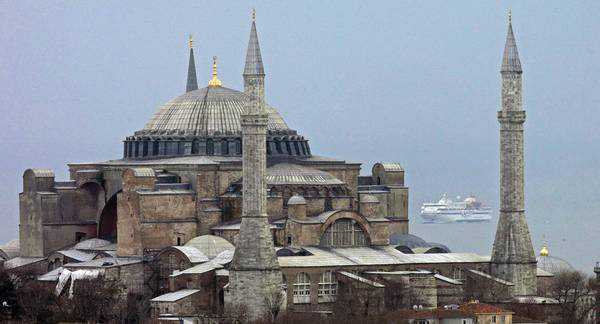
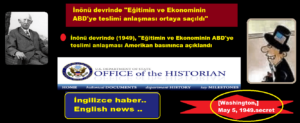
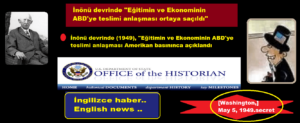
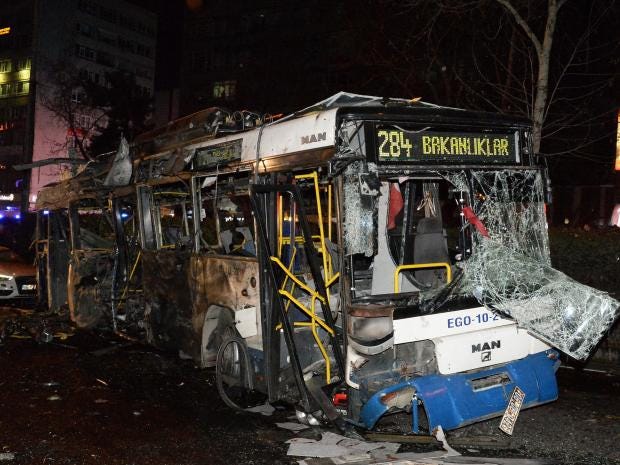


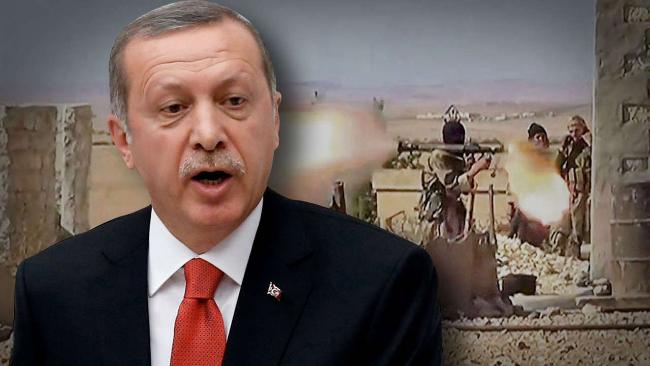

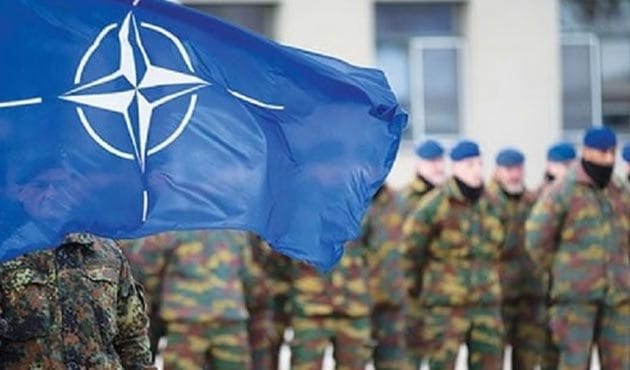

五大湖で発見された第二次世界大戦からの謎のナチス潜水艦
大戦からの謎の
Ah so, deska.
If it was sunk with crew aboard this is a War Grave and should be left alone!!!!!
Who authorized its disturbance?
As a submariner I find this very disturbing.
Ric,
you only made that statement to tell people you are a submariner. You could literally care less. The military decided to pull this vessel and the museum will work towards restoration appropriately and respectfully. Go back in your hole where you pretend to care.
that looks more modern. that doesn’t resemble any u boat I’ve seen .salvage a u boat that could potentially contain un exploded torpedoes etc. something isn’t adding up here.
j mcdowell, that’s because that’s a November class Soviet sub. Specifically K-159. It’s kind of sad a submariner didn’t recognize it.
drib:
Your comment is uncalled for. Why the personal attack? While your post is silent as to a submarine background, one can easily infer that you do not have one thus you are not qualified (pun not intended) to justify whether of not he cares. If you did, you would know about the tolling of the bells and the respect of submariners for those on eternal patrol.
Ric’s point is correct. Only under unique circumstances is a warship raised. For example there is a well know submarine wreck off of Newport RI that would be easily raised but it is designated as a war grave. Given the short time between discovery and raising, I doubt that they ascertained whether remains are on board. I also note the the article is silent as to Navy involvement. It appears to be a Coast Guard operation. In that this is not a hazard to navigation it should have been left alone until the Navy cleared it to be raised. As j mcdowell says, there may well be armed torpedoes aboard.
If there are Nazis on board dead for all those years retrive there remains to the shore make a pile with them and set them on fire they started a major world war then killed 6 million people
It states nowhere that the men of this ship escaped or were captured, this is a war grave albeit the enemy but never-the-less A WAR GRAVE this is desecration we wouldn’t want or allow on a submarine belonging to our people
drib…. the name fits…. better if it was dumbassdrip tho.
Yeah, those Submariners did walk a little light in the loafers, maybe those guys were doing the big nasty when it hit that depth charge, just saying
Like the CSS Hunley, which you submariners were all about raising and “preserving”?
Did ANYONE read the article? It has been identified and the type was given. It is NOT a Soviet sub.
Grave Robbers! What about the lost crew of this vessel. It is a graveyard for sailors. Since when is it accept to rob graves?
Unless Germany wants their sailors remains back. Germany may want to clear up some MIA files since they literally had thousands of MIA during the war. The ship wasn’t brought down in international waters either.
I was wondering that same thing!
drib, you are a Loser and need to crawl back into your Mothers cunt, pic was right in what he said. You probably never served and you deserved a good fuck in the ass.
You heard the man… it’s to be a major tourist attraction for the region… the dead be damned.. I agree with you – make it a dive site, but that’s all ..
I’m sure any bodies will be identified, family contacted, and proper reburial seen to.
Its all about the monetarily game, show me the money.
The article says how the sub was sunk but does not say anything one way or the other about the fate of the crew.
Show some respect for those who participated in and authorized the raising of the sub that they know what it and is not a War grave. They are not idiots as you are implying. Very likely they know whether their was any crew remains, something you do not, and if so, obtained the proper permissions beforehand.
What is disturbing is knee-jerk comments when you don’t know any of the facts.
I think this sub should be returned to Germany after America loses WW3.
Waah,waah! Get this guy a box of kleenex already!!!
I LOVE HOLES
Who knows for sure … maybe they all deserted then sunk it themselves
I agree Ric, I am also a submariner and this should have been left as a war grave just as the one off of Block Island, Rhode Island.
if its a war grave, they are in hell by now and can’t reincarnate, its not sacred grounds where good people died, its military killers who died, nothing sacred about that.
well they are nazi’s and i think its frickin awesome good job people that found it and your in the military cool i salute you
Ric: You sound disturbed.
I agree sir. Much as I would love to see more people experience what a German sub looks like, if there are souls aboard her she should remain intact and in place. I’ve dove the U-352 and a few others, but I would never penetrate a sub with known persons aboard, as many others have done. Let the German sailors rest in peace!
If I understand what I have read, no sign of bodies were mentioned, and in the cold temperature of the lakes, the preservation of remains would have been very good, and if sunk by the canadian coast, the chance of it making it up the river would have been very slim, if at all.
But if hit! and obtaining minor damage, it could have made it up river to the great lakes and there be scuddeled? Remember it was an experimental U bout, special parts that may not have been available for repairs, but safe to disembark. Just a theory. Mainly because it looks pretty good for a destroyed U-bout
I agree with you if it was a floating tumb, however I would wait for more info before being upset over it.
Not to be rude, but this is a “grave ship” site of nazis who were only there to destroy us. Why should we worry about disturbing it? I’m sure nazis would have the same respect.
I agree. But they will also be remembered by others now and for time to come. It was war, regardless of who side they are or were on they are humans. They will be honored by many..
I totally agree. As a retired military veteran, I appreciate your comment!
No way. their skeletons will be on display.
I agree Ric. And folks, a sub is a boat, NOT a ship
fully agree with you, Ric, and besides think, that to preserve this ship as a war memorial serves nobody and nothing
The only right grave for a Nazi is the one he finds in HELL.
There have been stories of Crews that have defected so it may not be a WAR GRAVE. The Crew may have scuttled it and went lived among the populous.
That’s an intriguing possibility. Would make a good movie.
I think I read that NOVEL about the German sub being sunk in Lake Ontario and the surviving crew living in Canada & northern US states.
This is exactly what I think. More than likely an escape sub from Germany. Could be that someone in Canada knows all about it, or they made their way down to South America with a few bars of gold.
Nazi’s? Leave it down there to rot.
Most rank and file members of the military in WWII Germany were not members of the Nazi party. They were guys drafted and doing a job.
Cruel bastards — yes, Nazis — not so much excepting the SS.
Germans and the s.s very different. My grandfather was first into italy and spent 10 months in stalag 7a and he never said he hated the German soldiers who he hated more was the Italians for raping a lot of women who he later shot he commented after walking up onto a village and these italians had french women hung and body parts missing. Even one mission the germans went into new york city to find key landmarks of interest. Glade they found this. I still have a medal my grandfather gave me that hitler gave to women who bore first sons he got it in a village that was destroyed along with nazi currency.
They where not any different than todays US conservatives… same idiology
US Conservatives are most definitely not akin to Nazism. Nazism is a branch on the Marxist tree, it a is perversion of Marxism more closely related with communism.
It is understandable that most people still think Germany started the War and it is hard to convince them that the Germans were put on an extermination list in the late 1800s. That was because they were a threat to financial interests.
I think the movie is call RED OCTOBER..
They may still be alive! Get them out.
How did this get past the falls? without being noticed?
The falls are above lake Ontario.
It sounds like it was found in Lake Ontario. The falls are in between Lake Erie and Lake Ontario
Niagara Falls is at the WEST end of Lake Ontario, not at he end of the St. Lawrence Seaway. And they say American’s don’t know geography!
only way to do that is via the locks.
How did it get through the lock system on the st Lawrence seaway?
I’d like to know how it pass the Wellington Canal. And any of you feel sorry for the Nazis on the sunken sub read the book MIRACLES WATER about how the Nazis sunk a British passenger ship fill with children being transported to Canada to escape the bombing of England by the Nazis. The biggest mistake we made in WW2 was not letting the Nazis and Soviets chew each other up.
It had to go up the Wellington Canal which is in Canada two of three miles north of Niagara Falls.